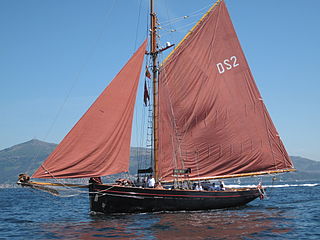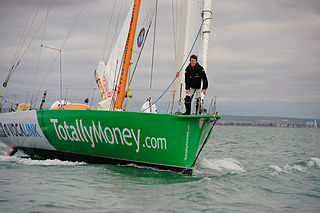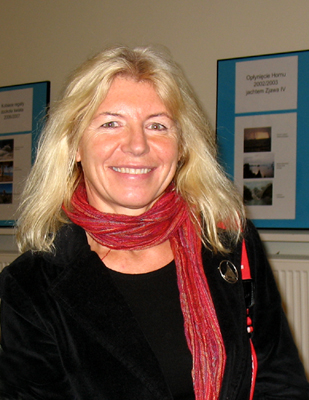History
Solo was built in 1955 in a Sydney ironworks factory by a Swiss engineer named Vic Meyer from Solothurn, Switzerland. It took two years to build Solo; Meyer and his son, Vic Meyer, Jr. did almost all of the work themselves.
The boat was designed by naval architect Alan Payne, who also designed Australia's first America's Cup challenger Gretel and Gretel II . When Solo was designed she was designed for cruising, but when Meyer tested her on her first sea trial Meyer saw that she was an extremely fast boat, so he decided to do some race sailing with her; from here on Meyer and Solo become recognized around the world for their feats and adventures.
Solo's racing career lasted for eight years (1955 to 1963). During that time Solo had won over 80 different races, never finishing worse than fourth place. Some of the more well-known races she won include winning the Rolex Sydney to Hobart four times, the Brisbane to Gladstone five times as well as a Trans Tasman Auckland to Sydney race. Unfortunately for Meyer, after winning all of those races nobody wanted to race Solo because they knew they didn't stand a chance because of her sleek lines, so Meyer started to lack the competition, he was also getting old in age, he was already 50 by the time he stated racing Solo, so he gave up racing after becoming a life member of the cruising yacht club of Australia and decided to do some cruising.
Cruising career
Meyer started off with an anti-clockwise circumnavigation around Australia with Tim Cormack crewing for the 13 week trip. Leaving Sydney 13 April 1962, it took them 13 weeks to complete. When they made it to Perth they learned that they were to be the first boat to circumnavigate in an anti-clockwise direction after Matthew Flinders in 1802/3. A yacht Warro circumnavigated Australia in a clockwise direction in the 1940's.
After he circumnavigated Australia he decided he wanted to do a bigger adventure and sail around the world. To sail around the world Meyer needed a crew; he was very known for picking all women crew at the time, because he said they worked harder and didn't complain as much. After his first voyage he went on to do it twice more surviving numerous groundings, a cyclone that almost sunk the boat and a demasting in the middle of the Pacific Ocean, again with all female crew. After his circumnavigations he decided that he was going to sell the boat, but before he sold Solo he wanted to make one more trip around Australia.
In Sydney, before departure a lady called Olga stepped on board; she was Meyer's only crew member at the time. Meyer left port around mid-April and sailed around the country. On Monday 14 April, it was overcast and with no offer of a chance to get a sight, that night the radar and echo sounder broke down, through battery failure it is believed, but there seemed no cause for immediate worry. Although a squally south Easter was blowing, everything pointed to Solo being well offshore. Meyer left the autopilot in charge for a while as he attempted to get the radar going again, but while plunging through a squall Solo went through the surf and onto the beach at Fraser Island at a spot about ten miles south of Happy Valley. The tide was well in and when it receded Solo was left high and dry. There she remained for over a month. Unfortunately, she had dug herself into the sand, a plan to bulldoze a channel out to the sea was not practical, and an attempt to tow her off had failed.
On Thursday, May 15, Solo was refloated by Brisbane salvage expert Joe Engwirda and the help from a high tide, after a two-day operation which had only one anxious moment when she was caught side-on by a large breaker she was floating, once clear of the breakers and into deep water a diver inspected Solo's hull only to find the only apparent damage was done to the rudder. Solo was towed by Mr Engwirda's barge to Mooloolaba 50 km south of her location, she was then towed to a boat yard where she had repairs carried out. During Meyer's stranding he proposed to Olga after she refused to leave him and the boat at Fraser Island. Olga was 25 and Meyer was 70. After Meyer and Olga got married they sold Solo and bought a mango farm on the Sunshine Coast Queensland. One night Vic and Olga were driving home, they were towing a caravan at the time and they had to cross a narrow bridge only suitable for one car at a time, already half-way across the bridge, a truck started to approach from the opposite direction, and to avoid a collision Vic had to steer off the bridge, unfortunately he did that and during that accident Olga drowned. After that accident Meyer sold his mango farm and moved back to Sydney to live the rest of his days. Vic Meyer died in 1993. Meyer had sailed over 300,000 nautical miles during his career.

Yacht racing is a sailing sport involving sailing yachts and larger sailboats, as distinguished from dinghy racing, which involves open boats. It is composed of multiple yachts, in direct competition, racing around a course marked by buoys or other fixed navigational devices or racing longer distances across open water from point-to-point. It can involve a series of races with buoy racing or multiple legs when point-to-point racing.

The Rolex Sydney Hobart Yacht Race is an annual oceanic yacht racing event hosted by the Cruising Yacht Club of Australia, starting in Sydney, New South Wales, on Boxing Day and finishing in Hobart, Tasmania. The race distance is approximately 630 nautical miles (1,170 km). The race is run in conjunction with the Royal Yacht Club of Tasmania, and is widely considered to be one of the most difficult yacht races in the world.

Jolie Brise is a gaff-rigged pilot cutter built and launched by the Albert Paumelle Yard in Le Havre in 1913 to a design by Alexandre Pâris. After a short career as a pilot boat, owing to steam replacing sail, she became a fishing boat, a racing yacht and a sail training vessel.

Gipsy Moth IV is a 53 ft (16 m) ketch that Sir Francis Chichester commissioned specifically to sail single-handed around the globe, racing against the times set by the clipper ships of the 19th century.
Minoru Saitō(斉藤 実, born January 7, 1934) is a Japanese solo yachtsman and one of the most notable veteran ocean sailboat racers in the world. He became the oldest person at age 77 to do a solo circumnavigation of the globe. He has successfully made eight solo circumnavigations.
The sport and practice of single-handed sailing or solo sailing is sailing with only one crewmember. The term usually refers to ocean and long-distance sailing and is used in competitive sailing and among cruisers.

The clipper route was derived from the Brouwer Route and was sailed by clipper ships between Europe and the Far East, Australia and New Zealand. The route, devised by the Dutch navigator Hendrik Brouwer in 1611, reduced the time of a voyage between The Netherlands and Java, in the Dutch East Indies, from almost 12 months to about six months, compared to the previous Arab and Portuguese monsoon route.

Sailing/Yachting is an Olympic sport starting from the Games of the 1st Olympiad. With the exception of 1904 and the canceled 1916 Summer Olympics, sailing has always been included on the Olympic schedule. The Sailing program of 1960 consisted of a total of five sailing classes (disciplines). For each class seven races were scheduled from 29 August 1960 to 7 September 1960 off the coast of Naples at the Gulf of Naples.

Michael Perham is an English sailor and adventurer from Potters Bar. In 2007 at the age of 14 he became the youngest person in the world to successfully sail across the Atlantic Ocean single-handedly, beating the record set in 2003 by British sailor Seb Clover. In 2009 at the age of 17 he became the youngest person to sail around the world solo. Perham's second record surpassed that of Zac Sunderland, an older 17-year-old American, set only six weeks earlier. Following this, Perham's adventures included driving around the world and racing in many offshore races, most notably the Sydney to Hobart yacht race in 2011 where his team placed second in class.
Sir William Herbert Northam, CBE was an Australian Olympic yachtsman and businessman.
Bruce Schwab is an American sailor and ocean racer. He circumnavigated the globe twice on his Open 60 racing yacht OceanPlanet becoming the 240th and then the 254th solo sailor to do so. Schwab is the first American to officially complete the famous Vendée Globe Race (2004–2005).

Joanna "Asia" Pajkowska is a Polish sailor, with a rank of captain, a sea life guard, she sailed over 250,000 nautical miles, often in singlehanded or in two-handed races. She is one of the best-known sailors in Poland and one of the most experienced ocean sailors in the world. In 2018 she completed, as the first Polish female sailor, singlehanded non-stop circumnavigation.

Jessica Watson is an Australian sailor who was awarded the Order of Australia Medal after attempting a solo circumnavigation at the age of 16. Although her voyage did not meet the distance criterion of 21,600 nautical miles (40,000 km) for a circumnavigation, Watson was nevertheless named the 2011 Young Australian of the Year and awarded the Medal of the Order of Australia in 2012 for "...service to sailing and to youth through the achievement of sailing solo and unassisted around the world [sic], and as a role model for young Australians". She currently resides in Melbourne. Netflix produced a film, True Spirit (2023), about Watson's voyage.
Australian Sailing magazine (ASL) was published by Yaffa Publishing Group, an independent publisher headquartered in Surry Hills (NSW). Founded in 1976, it was Australia's only dedicated yacht racing magazine.

Endeavour is a J-class yacht built for the 1934 America's Cup by Camper and Nicholson in Gosport, England. She was built for Thomas Sopwith who used his aviation design expertise to ensure the yacht was the most advanced of its day with a steel hull and mast. She was 130-foot (40 m) and launched in 1934 and won many races in her first season including against the J's Velsheda and Shamrock V. She failed in her America's Cup challenge against the American defender Rainbow but came closer to lifting the cup than any other until Australia II succeeded in 1983.

Abigail Jillian Sunderland is an American sailor who, in 2010, attempted to become the youngest person to sail solo around the world.

The sport of sailing involves a variety of competitive sailing formats that are sanctioned through various sailing federations and yacht clubs. Racing disciplines include matches within a fleet of sailing craft, between a pair thereof or among teams. Additionally, there are specialized competitions that include setting speed records. Racing formats include both closed courses and point-to-point contests; they may be in sheltered waters, coast-wise or on the open ocean. Most competitions are held within defined classes or ratings that either entail one type of sailing craft to ensure a contest primarily of skill or rating the sailing craft to create classifications or handicaps.

Alan Newbury Payne AM was a naval architect born in England but who worked in Australia. His yacht designs were readily built by both professionals and amateurs, and remain well represented in the ocean-going and coastal yacht fleet.

Kirsten Neuschäfer is a South African sailor specializing in high latitude and high adventure sailing. She is the winner of the 2022 Golden Globe Race, the first woman to win that race since it started in 1968; it also made her the first woman to win any round the world race by the three great capes, including solo and fully crewed races, non-stop or with stops; and the first South African sailor to win a round-the-world event.
Lisa Blair is an Australian solo sailor who holds multiple world records. She is also an advocate for action against climate change, which she promotes through her Climate Action Now project. She has written a book, Facing Fear, about her first attempt at circumnavigating Antarctica solo on her yacht Climate Action Now.













